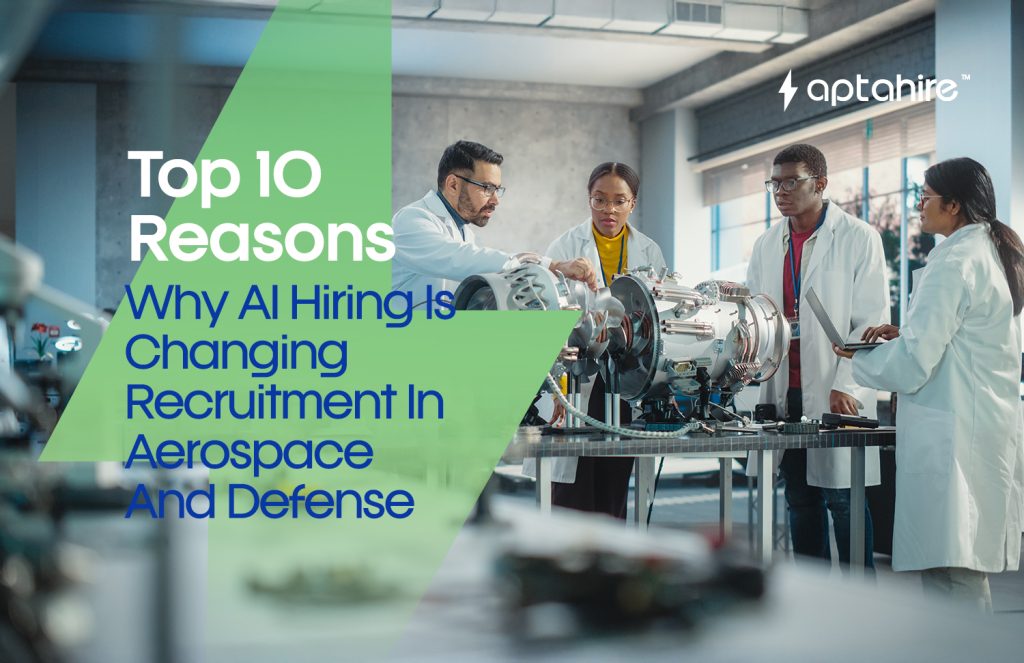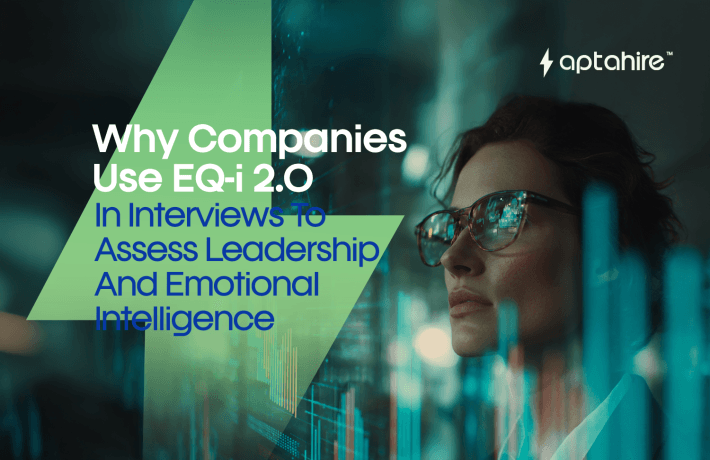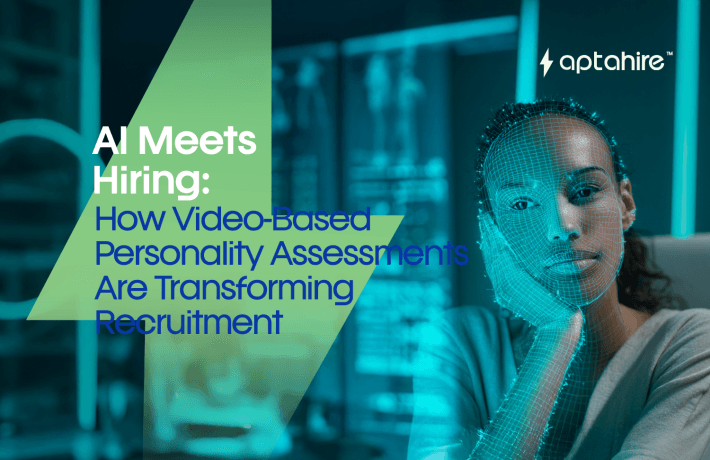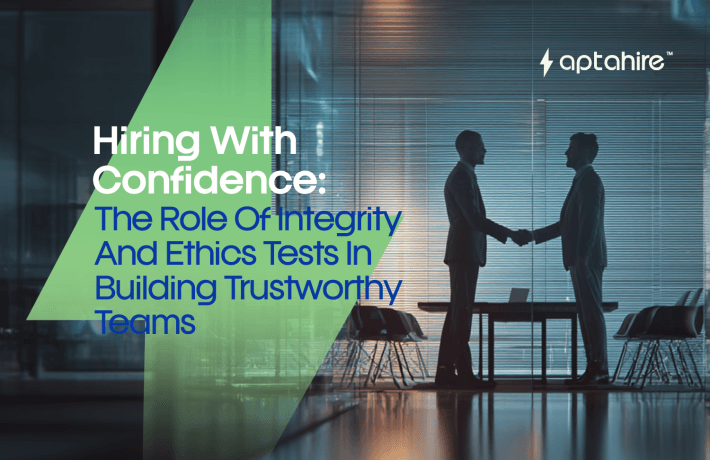Top 10 Reasons Why AI Hiring is Changing Recruitment in Aerospace and Defense

Hiring in the aerospace and defense sector has never been a walk in the park. We’re talking about an industry where the stakes are sky-high, quite literally. From building fighter jets and launching satellites to developing defense systems that safeguard nations, the margin for error is microscopic. In such a critical field, recruiting the right talent is not just important, it’s mission-critical.
Enter Artificial Intelligence (AI). It’s no longer just a buzzword or a futuristic idea. AI is fundamentally transforming the hiring landscape across industries, and in aerospace and defense, it’s doing so with surgical precision. Let’s dive deep into how and why AI hiring is redefining recruitment in this high-stakes field.
1. Precision at Scale: Matching Niche Skills with Niche Roles
Hiring for aerospace and defense roles isn’t like filling a standard IT job. You’re often looking for someone with experience in avionics and cybersecurity, or maybe someone who understands propulsion systems and simulation modeling. Finding this rare blend used to take months.
AI dramatically accelerates this by parsing through thousands of profiles and resumes to match highly specific technical skills, certifications, and clearances with open roles. Machine learning models can even predict which candidates are likely to succeed based on historical data.
In short: AI doesn’t just help you find candidates,it helps you find the right ones, fast.
2. Security-Centric Screening for Sensitive Roles
Let’s not forget, this industry is deeply entwined with national security. That means background checks, security clearances, and risk assessments are par for the course. Manual vetting of these credentials is time-consuming and prone to human error.
AI automates the pre-screening of candidates by verifying security clearances, cross-referencing databases, flagging inconsistencies, and even scanning social media behavior patterns, while remaining compliant with privacy laws.
The result? Safer, faster, and more reliable hiring for sensitive roles.
3. Combatting the Talent Shortage
Aerospace and defense are facing a talent crunch. The demand for skilled professionals far exceeds the supply, especially in areas like artificial intelligence, cybersecurity, and advanced manufacturing. Traditional methods simply can’t keep up.
AI helps employers tap into passive talent pools, identify hidden gems, and even forecast future talent needs based on project pipelines and attrition patterns.
AI doesn’t just find talent, it uncovers talent where others aren’t even looking.
4. Bias Reduction: Hiring for Merit, Not for Stereotypes
Let’s be honest! Bias, even if unintentional, can sneak into hiring decisions. And in a sector that thrives on innovation and diversity of thought, that’s a problem.
AI model- when trained and monitored responsibly, can help reduce unconscious bias in resume screening, interview evaluations, and candidate ranking by focusing purely on skill sets, qualifications, and performance data rather than names, genders, or backgrounds.
In a field driven by objectivity and science, AI brings neutrality back into recruitment.
5. Accelerating Clearance-to-Desk Timelines
In defense, once you find the right person, you need them now. But traditional onboarding and clearance processes often delay deployment. AI can streamline these steps.
With predictive analytics and real-time documentation verification, AI accelerates the timeline from job offer to active deployment, cutting down onboarding bottlenecks and expediting background checks.
Time saved isn’t just money saved, it could be mission success ensured.
6. Video Interview Analysis with Behavioral Intelligence
In high-stakes industries like aerospace and defense, it’s not just about what candidates say, it’s how they say it. AI-powered video interviews can analyze facial expressions, tone of voice, and even eye movement to detect honesty, stress, and confidence.
This is especially useful when hiring for roles involving decision-making under pressure, leadership in combat scenarios, or high accountability in mission-critical operations.
AI reads between the lines, literally.
7. Predictive Analytics: From Hiring to Long-Term Success
What if you could predict how a candidate will perform 6 months down the line? AI uses predictive analytics to correlate data from past hires with job performance, cultural fit, and retention rates.
Especially in long-term defense projects or multi-year aerospace contracts, this foresight helps in building teams that are both resilient and high-performing.
Hiring today with tomorrow in mind, that’s the AI edge.
8. Real-Time Labor Market Insights
The aerospace and defense industries are constantly evolving due to geopolitical shifts, emerging tech, and changing government regulations. AI continuously monitors labor market trends, industry news, and skill demand forecasts.
This enables recruiters to adapt quickly, pivoting hiring strategies, adjusting compensation packages, and aligning with future-proof roles.
Stay informed, stay ahead, because recruitment isn’t just about now, it’s about next.
9. Workflow Automation: Freeing Up Human Capital
Think of the number of repetitive tasks in recruitment: resume screening, interview scheduling, follow-up emails, onboarding paperwork. AI automates all of this.
This allows HR professionals and hiring managers in aerospace and defense to focus on strategy, engagement, and decision-making rather than being bogged down in logistics.
Let humans do what they do best: connect, assess, and lead. Leave the grunt work to AI.
10. Building Future-Ready Talent Pipelines
Let’s not forget: aerospace and defense projects span decades. Today’s intern could be tomorrow’s mission director. AI systems help build long-term talent pipelines by identifying high-potential individuals early and mapping out development paths.
From university partnerships to training and internal mobility, AI can suggest ideal career trajectories, reskilling paths, and leadership grooming strategies.
AI doesn’t just hire for today, it architects the workforce of the future.
Final Thoughts
AI is not here to replace humans in aerospace and defense recruitment. It’s here to augment them, empower them, and most importantly, elevate the mission of hiring the right people for the right jobs: faster, smarter, and fairer.
In a sector where every second counts and every decision can ripple into global outcomes, leveraging AI isn’t a nice-to-have, it’s a necessity.
So, the question isn’t if AI hiring will change aerospace and defense recruitment.
It’s already happening.
The real question is: Are you ready to fly with it?
FAQs
1. How is AI different from traditional recruitment methods in aerospace and defense?
AI-powered recruitment leverages data analytics, automation, and machine learning to identify, screen, and evaluate candidates faster and more accurately than traditional methods. Unlike manual hiring, which is time-consuming and prone to bias, AI can process thousands of data points to ensure skill alignment, security clearance, and long-term job success.
2. Can AI help find candidates with highly niche technical expertise required in aerospace and defense?
Absolutely. AI excels at parsing complex resumes, certifications, and experience records to match candidates with very specific technical skills, such as avionics systems, propulsion design, or aerospace materials engineering. It can even identify transferable skills from adjacent industries.
3. Is AI reliable for screening candidates who require security clearances?
Yes, AI tools can automate and verify pre-screening criteria like background checks, clearance documentation, and compliance protocols. While final clearance still requires official procedures, AI significantly reduces manual vetting time and flags potential red flags early.
4. How does AI reduce bias in aerospace and defense hiring?
When designed ethically, AI can neutralize unconscious human bias by focusing purely on objective data: such as skills, qualifications, and job performance indicators, rather than factors like gender, age, ethnicity, or background. This is especially critical in promoting diversity in a traditionally homogenous field.
5. Is AI hiring secure enough for sensitive defense recruitment?
Yes. Most AI recruitment platforms used in the aerospace and defense sector are built with strict data encryption, access control, and compliance with government regulations like ITAR (International Traffic in Arms Regulations). However, organizations must still audit systems regularly to ensure data integrity and security.
6. Can AI-powered video interviews really assess a candidate’s honesty or stress levels?
AI video platforms use behavioral intelligence to detect micro-expressions, tone changes, and eye movement, providing additional layers of insight. While they shouldn’t be the only deciding factor, they serve as valuable tools in evaluating high-pressure role suitability.
7. What impact does AI have on onboarding timelines in defense projects?
AI helps streamline onboarding by automating documentation, verifying credentials in real-time, and predicting any red flags before final offer issuance. This reduces the clearance-to-desk time, which is crucial for projects with tight deadlines.
8. Will AI replace recruiters in aerospace and defense hiring?
No, AI is not here to replace recruiters but to enhance their efficiency. It automates repetitive tasks, offers deeper candidate insights, and allows human recruiters to focus on strategy, relationship-building, and final decision-making. It’s a partnership, not a replacement



